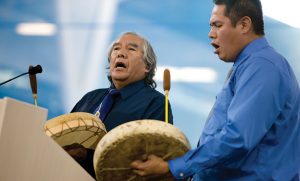In 1975, the U of L established the Department of Native American Studies, the first of its kind in the province. U of L alumnus, professor emeritus, honorary degree recipient and special assistant to the president, Dr. Leroy Little Bear (BASc (BA) ’72, LLD ’04), played a significant role in its establishment. Little Bear reflects on that notable time in the University’s history.
The Native American Studies department at the University of Lethbridge started as a dream. It was a dream in the hearts of faculty members, namely Menno Boldt.
We partnered together, started doing the research work and eventually had three other people come and assist us.

Dr. Leroy Little Bear (BASc (BA) ’72, LLD ’04)
We held two conferences — one with the youth and another with adults and elders. Out of those two conferences, and all the consultations we had with other schools as well as the Indian Association of Alberta, came the agreement: we didn’t want just another program. We wanted something really substantial — that is what universities are really about.
Universities are about courses, degrees and research. Universities are about the search for knowledge. If you look at it from that point of view, then Native American Studies — Native ways of knowing, Native ways of gaining knowledge, Native ways of methodology — are a different way of looking at the same reality. The inclusion of NAS is an attempt to enrich the overall experience of students and faculty and the University as a whole.
A report was written jointly by Menno, research assistants and I, and presented to the University. The University reviewed the report and really liked the idea. In fact, not one word was changed on the proposal. The University took the proposal to the Department of Advanced Education. After some communication, they decided to fund a Native American Studies department at the University.
The Department of Native American Studies came into existence in 1975 with a full major. We brought on some great faculty members like Christine Miller, Alfred Young Man and Tom King. Those were exciting days. Word about the program got out very quickly and we attracted students not only locally, but from all over.
Since then, the other Faculties have incorporated FNMI-focused programming. FNMI culture is woven into the fabric of the University, enriching teaching, learning and research. We are proud of our long history here.
The message we tell our students is: You come here to learn. You go out into the world to serve.
Over the years, I have had the privilege to sing the honour song for many students at Convocation. These students have gone on to become teachers, principals and community leaders. When I run into these former students, they always come to me and tell me how much the University influenced them, showed them the big picture and opened their world views.

